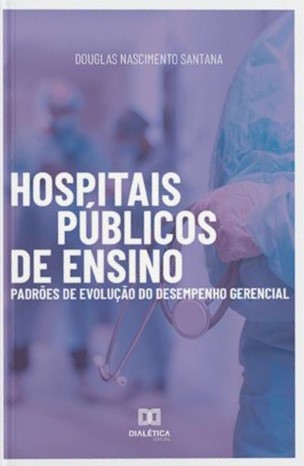
Medical doctor, diplomat and philosopher
Medical doctor, Master in Administration from the Federal University of Bahia (UFBA), Specialist in International Public Administration from the École nationale d'administration (l'ENA), Master in Political Science from the Université Paris 1 Panthéon-Sorbonne and Ph.D. in Philosophy from the University of Brasília (UnB). He is currently a diplomat at the Ministry of Foreign Affairs of Brazil. He concentrates his academic work in the areas of philosophy of science, international policy, public policy and health management, studying mainly the causality and decision-making rationality (individual and collective) in these domains.

Last published
Public university hospitals: the evolutionary patterns of managerial performance
Editora Dialética
Hospitais públicos de ensino: padrões de evolução do desempenho gerencial [original title]
What is the best way to manage Brazilian public university hospitals when seeking maximum performance? Management contracts, social organizations, public enterprises, Public-private partnerships… The reality of the hospital sector confronts us with a variety of concepts and structures that make it difficult for us to understand how the Brazilian public administration manages these organizations.
Starting from a classification of university hospitals in six types that make this complex reality intelligible, this book begins to answer this question by recounting how the Brazilian health system was reorganized around the principle of efficiency.
Efficiency as a principle does not necessarily mean high performance in the concrete world. To investigate this phenomenon, only abstract discussions are not enough. The author turns therefore our sight toward the empiric field. He carried out a study that compared the evolution of the performance in assistance, teaching and research activities of hospitals participating in the Evaluation System of University Hospitals of São Paulo, for five years, by using 26 production, productivity and quality indicators.
The empirical reality was revealing. Even immersed in a context of incentives to efficiency, teaching hospitals reacted differently, not always with an improvement in their performance. Numerous are the managerial variables that can determine these differences in the pattern of performance evolution; but there are three of them that should get our attention first. They will be the variables that will be discussed in depth in this work, a mandatory reading for health professionals who are interested in hospital administration and for managers who are concerned with the Brazilian health sector.
Articles
The European strategy for vaccines against Covid-19
Fin 2019, la Chine est frappée par un nouveau cycle de transmission d’une maladie contagieuse émergente, le Covid-19, causée par le virus SARS-CoV-2. Le 11 mars 2020, et alors que le Covid-19 touche plus de cent pays, y compris les États membres de l’UE, l’OMS qualifie la situation de pandémie mondiale. À ce moment-là, il n’existe aucun traitement spécifique ni aucun vaccin contre la maladie. Les experts médicaux conseillent des mesures non pharmacologiques pour tenter de ralentir la propagation du virus, comme la suspension des voyages internationaux, la restriction à la circulation des personnes dans les territoires nationaux et la distanciation physique. Dans ce contexte d’incertitude, les États membres de l’Union européenne prennent de nombreuses mesures unilatérales, non coordonnées entre elles, y compris des restrictions à la circulation de personnes à l’intérieur de l’espace Schengen. Le début de la riposte européenne à la crise sanitaire est donc marqué par l’autonomie décisionnelle des États membres. Si l’on s’en tient à l’acquis juridique communautaire, on ne pouvait pas espérer beaucoup de la part de l’UE en matière d’intervention dans le domaine de la santé. Conformément à l’article 168 du traité sur le fonctionnement de l’Union européenne (TFUE), les États membres sont responsables de la définition de leurs politiques de santé et de l’offre de services et soins médicaux sur leur territoire. L’Union dispose seulement d’une « compétence d’appui » dans ce domaine. En juin 2020, la Commission européenne élabore pourtant une stratégie commune de l’Union en matière de vaccin. Cette note de synthèse a pour but de mieux comprendre ce retournement de situation.
The fisicalists bases of evolutionism in the syntetic theory of evolution
The Synthetic Theory of Evolution contemplates a set of concepts and principles representing philosophical preconditions to be fulfilled to understand evolutionary phenomena. This philosophical framework is heterogeneous: its components derive from different lines of scientific thought and conceptual histories. We investigate the physical sciences’ assumptions that support the evolutionary thesis, especially the presence and use of the notion of cause and causality. Three dimensions are explored: epistemological, methodological, and formal. Through the epistemological analysis, we conclude that the evolutionary episteme is, in fact, based on physicality principles, especially on mechanical causality. Evolutionism uses explanations from the inorganic world to understand biological phenomena since its foundation. The most recent descriptions of heredity and genetic variation through physical-chemical reactions reinforce this influence. Through a methodological investigation, it is evidenced that the experimental-quantitative method is appropriate for studying biological phenomena when the objective is to find proximate (functional) causation. Nevertheless, when dealing with the ultimate (evolutionary) causation, the historical-comparative-observational method tends to become the main investigation instrument. Through the formal analysis of the logical and linguistic elements of evolutionism, we outlined its argumentative structure’s commitments with the naturalist-nomological assumptions of the physical sciences. There are evident regularities in biological phenomena. However, the concept of biological law needs to be nuanced by the description of its peculiar elements, such as the probabilistic character inherent in its application to repetitive phenomena, and the limited power to generalize operating rules when it comes to singular events.
Posts
Contact
For LECTURES, CONFERENCES, COURSES, COACHING or ACADEMIC EXCHANGE, you can contact us by using the form or one of the methods below:
Mailing













